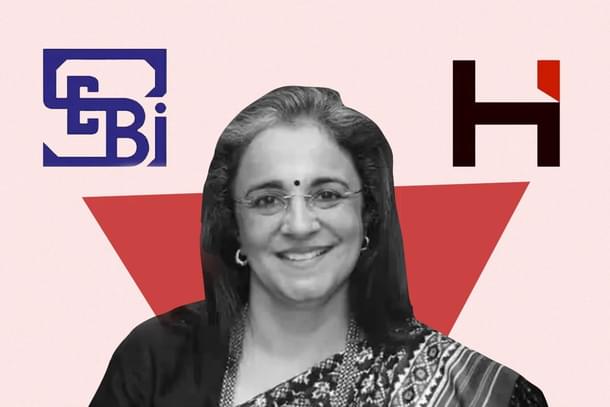Business
Hindenburg's Charges Against SEBI Are Mostly 'Nonsense', A Pre-Emptive Strike To Prevent Action
R Jagannathan
Aug 12, 2024, 02:22 PM | Updated Aug 19, 2024, 03:11 PM IST
Save & read from anywhere!
Bookmark stories for easy access on any device or the Swarajya app.


Nobody can argue with the idea that Caesar (and the spouse) must be above suspicion.
So, when Hindenburg Research accused Securities and Exchange Board of India (SEBI) Chairperson Madhabi Puri Buch and her husband Dhaval Buch of conflicts of interest and questionable financial dealings linked to offshore firms two days ago, everybody was bound to sit up and take notice (check the allegations and the Buchs’ responses here and here).
But while economists and market mavens could barely suppress a yawn after reading the details, the report’s contents were lapped up by opposition political parties, with the likes of Rahul Gandhi seeking Buch’s resignation.
Gandhi claimed that “The integrity of SEBI, the securities regulator entrusted with safeguarding the wealth of small retail investors, has been gravely compromised by the allegations against its chairperson.”
This is bunkum, for it is not the regulator’s job to directly protect the wealth of small retail investors, but to ensure the systemic integrity of the stock markets and prevent unfair practices.
Even when Hindenburg first made allegations against the Adani Group in January 2023, the market, after a brief crash, steadied itself, and this is because the stock exchanges and SEBI ensured that nobody would default.
SEBI’s actions saved the small investor from speculatory forces last year. And once the probe into Adani Group entities was submitted to the Supreme Court, even Adani Group shares were back to their high perches.
The stock markets were equally blase today (12 August) when they reopened after the weekend. Hindenburg’s accusations, this time against SEBI, were simply ignored.
If the market believed that the SEBI chief was busy helping Adani cover up its lapses due to her alleged conflicts of interest, Adani shares too should have crashed. But nothing of that kind happened.
So why did Hindenburg bother?
One cannot speculate on Hindenburg’s motives, but clearly this was meant to be some sort of a riposte to SEBI’s audacity in sending a 46-page show cause notice in July this year asking questions about Hindenburg’s report and its aftermath last year.
Hindenburg termed the show cause notice as “nonsense”. In effect Hindenburg was telling SEBI, “look, I work in an advanced market, and you have no business questioning me”.
If SEBI has any pride, it should go after Hindenburg and its direct or indirect partners in India — just as the US SEC does if it is challenged — for no speculator should have the audacity or arrogance to question the actions of a regulator operating under the watchful eyes of the Supreme Court.
But this is where Hindenburg may have tied SEBI’s hands. By making direct allegations against Buch and SEBI, the firm has effectively insulated itself from future SEBI action against Hindenburg, for it will seem like the regulator is going after Hindenburg because of these allegations.
The following is the gist of Hindenburg’s allegations, and why they make little sense.
One, Madhabi and Dhaval Buch invested in some offshore funds allegedly set up by Adani. But they exited well before SEBI started probing Adani, and hence there can be no quid pro quo here.
Two, when Buch was a wholetime SEBI member, her husband joined Blackstone as an advisor. Blackstone could be said to be a beneficiary when SEBI liberalised rules for Real Estate Investment Trusts in which Blackstone had an interest. But these rule changes were sought by many investors and not just Blackstone. So there is no direct linkage here.
Three, a short while after becoming chairperson of SEBI, Buch shifted ownership of her stake in a Singapore-based consulting outfit to her husband. One can hardly claim this is any proof of conflict of interest, since it is not illegal for the spouse of a SEBI chief to own a consulting outfit abroad.
In short, the allegations against the SEBI chief are thin and not even worth considering as proof of a conflict of interest.
This article is not meant to go into every detail of Hindenburg’s allegations against Buch, but to contrast how US regulators treat their business icons, and how they decide whom to go after. One would like to state that big business houses like Adani and Ambani, who have a larger-the-life impact on the markets and business confidence, cannot be wantonly subject to reputational damage by a careless regulator.
In the last two decades, the US Securities and Exchange Commission (SEC) went after Rajat Gupta and Raj Rajaratnam over insider trading accusations, and got both of them convicted, sending them to jail. But it did almost nothing against bigger American business icons.
In 2011, SEC first accused Gupta of insider trading, but when Gupta sued, the SEC backed off. But a few months later, using wiretaps, it again went after Gupta and got him convicted and jailed quickly — apparently because he gave information about a Goldman Sachs board meeting to Rajaratnam. He was convicted even though he did not use this inside information to benefit himself. Clearly, some targets are more expendable.
Contrast this with how the SEC ignored possible rule violations involving Hank Paulson, Warren Buffett, Steve Jobs, Michael Dell, and some others.
As I wrote in Firstpost more than a decade ago, in 2008, after the Lehman crash, Hank Paulson, George Bush’s treasury secretary, told some fund managers that he was going to seize Fannie Mae and Freddie Mac, two government-sponsored mortgage institutions, in order to prevent them from collapsing. Inside information on an impending government decision was shared with outsiders, but the SEC did not act against Paulson. Before he became treasury secretary, Paulson was head of Goldman Sachs.
In the Warren Buffett case, his key associate, David Sokol, at one time considered his likely successor, bought shares in Lubrizol even as he was trying to get Buffett to buy the company. Buffett knew about Sokol’s deals only after he bought the company, or so we are told. No harm was done to Buffett’s reputation in this caper.
As for Steve Jobs, he received back-dated stock options, apparently done through forgery. But the SEC said Jobs may have been unaware of this forgery. Michael Dell also received “illegal” IPO allocations from Wall Street investment banks, probably with a view to receiving future favours from him. But while others were pulled up for such similar favours, Dell was spared.
The point here is that it is unusual for a regulator to go hammer and tongs after a business icon because of the larger damage it may cause to the credibility of the markets and business confidence. It is only when the misdemeanours indulged in by businessmen are so serious that it is worth risking larger damage to that business and the markets.
Whether SEBI went soft or hard on Adani is for the judiciary to determine, not Hindenburg. But the allegations made by Hindenburg against Buch are clearly intended to damage the Indian regulator’s reputation.
Hindenburg’s current allegations against SEBI and Buch need to be junked in the same way Hindenburg junked SEBI’s show cause notice: they are irrelevant nonsense.
Jagannathan is former Editorial Director, Swarajya. He tweets at @TheJaggi.





